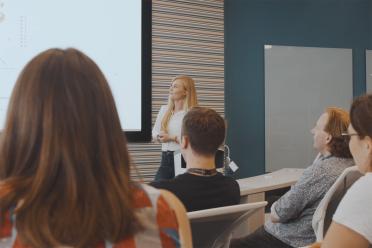Although you’re taught to expect that some experiments fail and projects inevitably change, accepting and responding to that is easier said than done. It’s very difficult not to be thrown off by a curveball, even if you are expecting one to come your way at some point.
At the start of my second year I was filled with excitement that I had more confidence in my project and was about to get stuck into writing a paper and presenting at international conferences for the first time. I felt like I was on a roll, and then the pandemic hit.
Like everyone on the planet, 2020 was a difficult year for me. I’m extremely grateful for how fortunate I have been throughout this pandemic and am thankful for the safety of my loved ones. Inevitably my experiments had to be paused for a while, and the plan was to switch focus to data analysis and writing.
I was privileged to have the ability to continue working from home, but finding the clarity needed to focus on work for me was nearly impossible. Balancing caring responsibilities whilst struggling with my own mental health, and having family in Brazil hospitalized with COVID-19... Well, work was the last thing on my mind.
I picked up new habits over the lockdown when I needed to spend time away from my desk - the biggest one being caring for houseplants. I now have a mini rainforest in my apartment! I also spent a lot of time cooking, which in some ways was the closest thing to lab work I could get. Oh, and I completed all of Marvel, Lord of the Rings and Star Wars a few times over!
Part of me was self-reassuring that it would all be ok as long as I’d have this big bounce-back moment - which didn’t quite happen. My colleagues and friends were incredibly supportive, and as I gradually found new ways of coping I started seeing my old self come back.
At the start, I felt as if asking for more guidance would give the perception that I was somehow less capable and less independent than ‘a third year should be’. Taking a step back, I see now that knowing when to ask for help is an attribute of a successful PhD student, not one who is failing.













